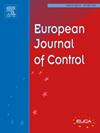位置伺服机器人关节位置跟踪的积分滑模平滑控制
IF 2.6
3区 计算机科学
Q2 AUTOMATION & CONTROL SYSTEMS
引用次数: 0
摘要
由于机器人在各行各业的应用越来越广泛,设计鲁棒控制系统,特别是轨迹跟踪控制系统一直是一个研究热点。为这些系统开发有效的控制算法也提出了重大的理论挑战。然而,控制设计通常基于理想的、无记忆的扭矩执行器的隐含和不切实际的假设,而在实践中,机器人配备了接收位置命令作为输入的位置伺服执行器。在分析和实现过程中,这种差异经常被忽视。为了解决这一缺点,本文提出了一种关节空间中位置伺服驱动机器人运动跟踪的积分滑模控制方法,其中输入是执行器接收到的期望位置信号。假设机器人的机械动力学和伺服参数是未知的,得到无模型控制器。该方法的一个显著特点是控制动作平滑,有效地避免了有害的抖振现象。我们保证在存在未知有界连续扰动的情况下也能实现控制目标。对安装位置伺服作动器的机械臂进行仿真,验证了所提控制策略的有效性。本文章由计算机程序翻译,如有差异,请以英文原文为准。
Integral sliding mode smooth control for joint position tracking of position servo-actuated robot manipulators
Designing robust control systems for robotic manipulators, especially for trajectory tracking, is an ongoing research focus due to their growing use in various industries. Developing effective control algorithms for these systems also presents a significant theoretical challenge. However, control designs are often based on the implicit and unrealistic assumption of ideal, memoryless torque actuators, whereas in practice, robots are equipped with position servo actuators that receive position commands as input. This discrepancy often goes unnoticed during analysis and implementation. To address this shortcoming, this paper proposes an integral sliding mode control approach for motion tracking of position servo-actuated robotic manipulators in joint space, where the inputs are the desired position signals received by the actuators. The robot’s mechanical dynamics and servo parameters are assumed to be unknown, yielding a model-free controller. A notable feature of the proposed approach is that the control action is smooth, effectively avoiding the harmful chattering phenomenon. We ensure that the control objective is achieved even in the presence of unknown bounded and continuous disturbances. Simulations of a robot manipulator equipped with position servo actuators demonstrate the effectiveness of the proposed control strategy.
求助全文
通过发布文献求助,成功后即可免费获取论文全文。
去求助
来源期刊

European Journal of Control
工程技术-自动化与控制系统
CiteScore
5.80
自引率
5.90%
发文量
131
审稿时长
1 months
期刊介绍:
The European Control Association (EUCA) has among its objectives to promote the development of the discipline. Apart from the European Control Conferences, the European Journal of Control is the Association''s main channel for the dissemination of important contributions in the field.
The aim of the Journal is to publish high quality papers on the theory and practice of control and systems engineering.
The scope of the Journal will be wide and cover all aspects of the discipline including methodologies, techniques and applications.
Research in control and systems engineering is necessary to develop new concepts and tools which enhance our understanding and improve our ability to design and implement high performance control systems. Submitted papers should stress the practical motivations and relevance of their results.
The design and implementation of a successful control system requires the use of a range of techniques:
Modelling
Robustness Analysis
Identification
Optimization
Control Law Design
Numerical analysis
Fault Detection, and so on.
 求助内容:
求助内容: 应助结果提醒方式:
应助结果提醒方式:


